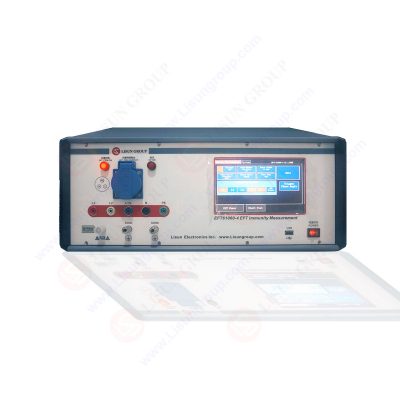

Abstract
In modern electronic design and compliance testing, immunity to electrical fast transients (EFT) is a critical performance indicator. The eft test generator serves as a standard tool to simulate such disturbances, ensuring electronic equipment can withstand operational disruptions. This paper discusses the technical principles, structural design, and test methods of the eft test generator, with a focus on the LISUN EFT61000-4 EFT Immunity Measurement product. The study elaborates on how the generator fulfills IEC61000-4-4 standard requirements, providing stable and repeatable test environments. Experimental configurations, waveform specifications, and output characteristics are presented alongside practical application scenarios in electronic testing environments.
Introduction
The rise of digital control systems and power electronics in today’s industry has made electromagnetic compatibility (EMC) compliance more essential than ever. Among various EMC tests, immunity to electrical fast transients (EFT), also known as burst immunity, is mandatory per international standards. EFT disturbances typically originate from switching transients such as relay contact bounce or interrupting inductive loads. The eft test generator simulates these conditions, enabling effective validation of device immunity. The LISUN EFT61000-4 EFT Test Generator is a mature solution developed to precisely meet the IEC61000-4-4 standard, providing essential support for EMS (Electromagnetic Susceptibility) testing.
EFT Test Generator: Functional Overview
The eft test generator is designed to create a burst of high-frequency transients with short rise times and fixed intervals. These impulses are coupled onto the power lines or signal lines of the equipment under test (EUT) to verify its resistance to disturbance.
Key Functions of EFT Test Generator:
Feature
Description
Pulse Rise Time
Typically less than 5 ns
Burst Duration
Up to 15 ms
Repetition Rate
Up to 5 kHz
Voltage Range
From 250V to 5,000V
Output Impedance
50Ω standard
Coupling/Decoupling Network
Integrated or external CDN as per IEC61000-4-4
Compliance with IEC61000-4-4 Standard
The IEC61000-4-4 standard defines the testing methodology and waveform parameters for EFT testing. It mandates waveform shapes, duration, repetition rate, and coupling methods. The LISUN EFT61000-4 is engineered in full compliance with this standard and provides configurable parameters to allow for flexible test setups.
IEC61000-4-4 Standard Burst Characteristics
Parameter
Requirement (Per IEC61000-4-4)
Rise Time of Pulse
5 ns ±30%
Pulse Duration (at 50Ω load)
50 ns ±30%
Burst Duration
15 ms ±20%
Burst Period
300 ms ±20%
Repetition Rate
5 kHz (typical)
Test Voltage
Up to 5,000V
Technical Principle of EFT Generation
The generation of EFT involves a capacitor discharging through a fast-switching device such as a spark gap or semiconductor switch, into a standard impedance network. The key requirement is achieving extremely fast rise times and narrow pulse widths.
The LISUN EFT61000-4 uses a high-voltage MOSFET-based discharge switch that ensures consistency in pulse generation. Coupled with an advanced timing controller, the generator delivers programmable bursts with high accuracy and reliability.
LISUN EFT61000-4: Product Features
The LISUN EFT61000-4 EFT test generator is known for its compact design and versatility. It supports various test levels and provides built-in safety mechanisms.
EFT61000-4_EFT Immunity Measurement
Product Specifications
Model
LISUN EFT61000-4
Output Voltage
250V – 5,000V (adjustable)
Pulse Rise Time
< 5ns
Pulse Width
50ns
Burst Frequency
0.1 – 5kHz
Burst Duration
0.75 – 15ms
Output Polarity
Positive/Negative/Both
Coupling Methods
AC/DC power lines, signal lines via CDN
Display
7-inch touchscreen with parameter presets
Control Interface
USB/RS232/LAN remote control
Safety Features
EUT overload protection, emergency stop
Application Scenarios
The eft test generator is widely used across multiple industries:
• Household Appliance Testing – ensuring products meet EMC regulatory compliance.
• Automotive Electronics – verifying ECU systems can withstand transient disturbances.
• LED Driver Circuitry – validating robustness against switching noise.
• Industrial Controllers – ensuring PLCs and SCADA devices remain operational under noise conditions.
• Telecommunication Systems – safeguarding routers and modems from power-induced transients.
Test Setup and Procedure
To perform an EFT immunity test using the LISUN EFT61000-4, the following steps are taken:
Test Setup:
• Connect the CDN to the EUT’s power supply.
• Set desired test parameters via the control panel.
• Grounding and shielding according to standard layout.
• Initiate the test and observe EUT performance.
• Log disturbances and post-test results.
Test Level Guidelines
Per IEC61000-4-4, standard voltage levels are defined for different environments:
Test Level
Open Circuit Test Voltage
Application Environment
Level 1
500V
Light Industrial, Residential
Level 2
1,000V
General Commercial Equipment
Level 3
2,000V
Industrial Control Systems
Level 4
4,000V
Harsh Industrial, Critical Systems
Custom
Up to 5,000V
R&D and Stress Testing
Advantages of LISUN EFT61000-4 System
• Modular Design – easy integration into automated EMC labs.
• Flexible Interfaces – remote configuration support.
• Advanced Safety – overload and spark detection.
• Multi-Language Support – international usability.
• User-Friendly GUI – touch-screen operation for faster workflows.
Conclusion
The eft test generator plays a pivotal role in EMS immunity evaluation, enabling engineers to identify and mitigate susceptibility to transient disturbances. The LISUN EFT61000-4 test generator, built to the precise requirements of IEC61000-4-4, offers a highly reliable and customizable solution for commercial, industrial, and research applications. With programmable bursts, comprehensive coupling options, and robust safety features, it ensures thorough compliance testing across a broad range of electronic equipment. https://www.lisungroup.com/news/technology-news/application-and-performance-of-eft-test-generator-in-iec61000-4-standard-immunity-testing-a-focus-on-lisun-eft-immunity-measurement.html
.jpg)
Comments
Post a Comment